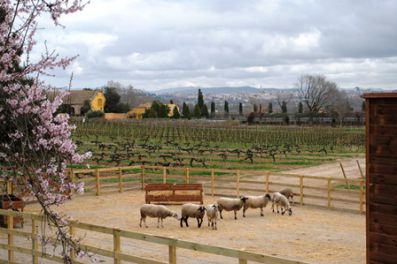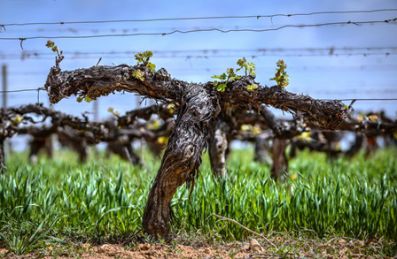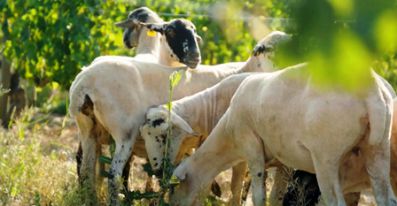Familia Torres commits to regenerative grape growing to fight against climate change
Regenerative techniques restore the balance of soils and increase their ability to fix atmospheric CO2. The winery wants to transform over 500 hectares of its organic vineyards in Catalonia within five years. The regenerative model will help the winery to fulfill its environmental commitment: having a positive impact on the climate by 2050.
Familia Torres has launched an agricultural plan to implement the regenerative agriculture model in its organic vineyards. The aim is to achieve a new balance based on increasing biodiversity and organic matter naturally, thus enhancing the role of the vineyards as carbon sinks. The fifth generation of the family-owned wine business, based in Penedès, has decided to go one step further in its commitment to the environment by adopting regenerative grape growing, in its holistic approach to the land, as one of the solutions for fighting against climate change and achieving its aim of having a positive impact on the climate starting from 2050.
 Familia Torres’ agricultural plan includes the conversion, over five years, of more than 500 hectares of organic vineyards owned by the family and spread across the Penedès, Priorat, Conca de Barberà, and Costers del Segre denominations of origin. Some of the regenerative practices are already currently in use as part of the winery’s vineyard management, while additional ones will also be implemented gradually to regenerate the soil, with adjustments made based on the results. As a starting point, trials will be done at the following estates: Mas La Plana in Pacs del Penedès (DO Penedès), Mas de la Rosa in Porrera (DOQ Priorat), Milmanda in Vimbodí i Poblet (DO Conca de Barberà), as well as in the Jean Leon vineyards, where several projects are already being carried out.
Familia Torres’ agricultural plan includes the conversion, over five years, of more than 500 hectares of organic vineyards owned by the family and spread across the Penedès, Priorat, Conca de Barberà, and Costers del Segre denominations of origin. Some of the regenerative practices are already currently in use as part of the winery’s vineyard management, while additional ones will also be implemented gradually to regenerate the soil, with adjustments made based on the results. As a starting point, trials will be done at the following estates: Mas La Plana in Pacs del Penedès (DO Penedès), Mas de la Rosa in Porrera (DOQ Priorat), Milmanda in Vimbodí i Poblet (DO Conca de Barberà), as well as in the Jean Leon vineyards, where several projects are already being carried out.
According to Miguel Torres Maczassek, General Director of Familia Torres and a member of the family’s fifth generation: “We’re aware that this is a long learning process where we’ll also have to ‘unlearn’ to find a new balance.” He adds: “It’s a paradigm shift in vineyard management, but we believe that it’s necessary because regenerative grape growing is currently the only solution that makes it possible to store atmospheric carbon in the soil and fight against climate change.”
For Familia Torres, organic grape growing is one step in the right direction, but it is not enough faced with the challenge of the climate emergency, since organic practice does not cover CO2 emissions and fixing. The foundations of the regenerative or holistic
agriculture models are based on the principles of organic agriculture but go further as they also include the goal of recovering the life of the soils. This, by extension, contributes directly to increasing the soils’ ability to capture and fix atmospheric carbon and thus
reduce the concentrations of this greenhouse gas in the atmosphere, one of the causes of global warming.
 Regenerative grape growing: a key to improving the quality of the soils, the wines, and the environment
Regenerative grape growing: a key to improving the quality of the soils, the wines, and the environment
Regenerative agriculture seeks to restore the natural ecosystem based on eco-friendly techniques that bring together age-old know-how and modern technology. Its main pillars are increasing soil organic matter naturally; not plowing by turning the earth to avoid damaging the surface and prevent the release of the carbon stored in the soil; using ground cover to maximize the assimilation of atmospheric CO2 and increase biodiversity.
To increase organic matter, the regenerative model includes different strategies such as the use of organic compost and animals – e.g. sheep in the vineyards – to encourage soil fertilization naturally. More fertile soil facilitates the appearance of spontaneous or
sewn ground cover, which will increase the accumulation of carbon in the roots and the soil. With all of these actions together, it is estimated that the soil could fix around three tons of CO2 per hectare per year.
Based on the experimentation carried out so far, cover crops in the vineyards favor a decrease in production. Moreover, soil with more life makes it possible to retain rainwater and get through periods of drought more easily, also avoiding soil erosion. The long-term aim is to achieve a delay in grape ripening that will make it possible to partially mitigate the premature harvests caused by global warming. Finally, the increase in biodiversity as a result of a higher amount of organic matter in the soil promotes a better balance in the vineyard and the creation of a more stable ecosystem that will give the vines natural defenses against possible pests and diseases.
For Miguel Torres, “All of the aspects that are a result of having more alive, balanced soils are very positive in vine-growing that’s aimed at high-quality wines and against a backdrop of climate change. These regenerative techniques will not only help us to make better wines, but they’ll also allow us to turn our vineyards into big carbon sinks, and this way, we may contribute to slowing down climate change.”
The philosophy of more holistic or less interventionist agriculture has been promoted by names in the field such as Allan Savory and Masanobu Fukuoka, among others. Conventional agriculture based on agrochemicals and the over-exploitation of land has caused the degradation and desertification of millions of hectares around the world. This wasteland is unable to store atmospheric carbon. It is, therefore, necessary to rethink conventional farming models to incorporate regenerative practices. Regenerative agriculture means doing a 180 with regard to conventional agriculture, and also in terms of traditional grape-growing practices, but still it has clear advantages for high-quality grape growing, especially in Mediterranean climates.
 Having a positive impact on the climate: Familia Torres’ commitment by 2050
Having a positive impact on the climate: Familia Torres’ commitment by 2050
The fifth generation of Familia Torres makes this commitment to regenerative agriculture as part of Torres & Earth, the environmental program launched in 2007 to help to fight climate change.
The use of renewable energy sources, energy efficiency measures, sustainable mobility, and reduced bottle weight, among other actions, have enabled the winery to reduce its CO2 emissions per bottle (direct and indirect) by 30% between 2008 and 2019. Now,
Familia Torres is aiming its efforts at capturing and fixing CO2 by promoting projects such as the reforestation of Chilean Patagonia, carbon capture reuse (CCR) technology, and regenerative practices. Its goal is to reduce its carbon footprint by 55% by 2030 and have a positive impact on the climate (“climate positive”) from 2050.
Familia Torres has cofounded, together with the Californian winery Jackson Family Wines, the International Wineries for Climate Action (IWCA) association, currently made up of ten wineries from six countries, to promote the decarbonization of the wine industry at a global level. IWCA has a regenerative grape-growing working group.





